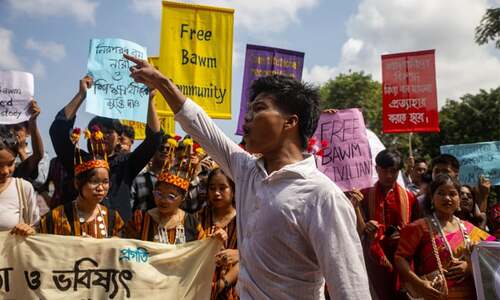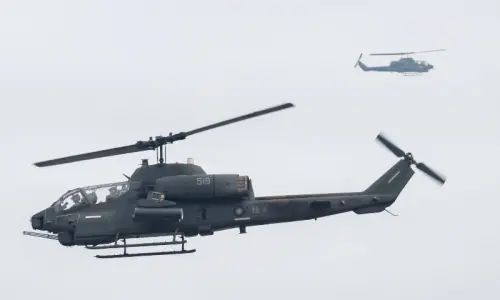ABU GHRAIB: More aggressive US military operations in Iraq over the past two months have generated a surge in detainees, nearly doubling the number held by US forces to about 8,300, according to the US general in charge of detention operations.
Since early October, the number of detainees in US custody has grown by about 4,000 as a result of assaults on insurgents in Samarra, Fallujah, Mosul, north Babil province and elsewhere, Maj-Gen Geoffrey Miller said on Friday. With additional US raids being planned as part of a stepped-up effort to crush the insurgency ahead of national elections in January, the number of detainees is expected to continue to grow in coming weeks.
The large influx of prisoners is putting stress on US detention operations, providing the biggest test yet of new facilities and procedures adopted in the wake of the Abu Ghraib prison scandal this past spring, Miller and other officers said in interviews here. So far, the flow has been manageable, they said, but many detainees have not yet made it through the system.
The mistreatment of Iraqi detainees by US soldiers at this facility last autumn was documented in photographs and videos that shocked the world when they surfaced in the spring and prompted a series of investigations. While about 50 military police, intelligence, medical and civilian contract personnel were eventually implicated, investigators also blamed senior leadership for failing to provide clear guidance or exercise adequate oversight.
US commanders responded to the scandal by implementing new controls over military police and intelligence operations and by bringing in Army corrections specialists to advise and help run the facility.
The prison building that was the site of abuses by American guards has been turned over to Iraqi authorities and is used to jail criminals. Detainees in US military custody are kept in recently constructed camps with climate-controlled tents and such amenities as movies and a library.
Miller, who has been supervising detention operations since April, said many of the changes, including a computerized record- keeping system, had enabled guards and interrogators to operate more efficiently. Also helpful is the experience soldiers have gained since taking over at the start of the year from the units involved in the scandal.
Of the 8,300 detainees, about 4,600 are at Camp Bucca, a US detention facility in southern Iraq that held 2,500 two months ago. The total here at Abu Ghraib is about 2,000, and about 1,700 remain in the custody of field commanders, whose troops are conducting initial screening interviews.
Under current rules, the initial screening of detainees by field units must be done within 14 days of capture. Detainees considered to be of some value are then forwarded here for further interrogation and assessment over a period of up to three months.
Miller said recent interrogations have yielded some "high- value information" about insurgents' hiding places, movements and methods. Although the large majority of those seized up to now had tended to be low-level "trigger pullers" with little information about the leadership or financing of the insurgency, more than 150 people caught since October had been classified as "MI hold", meaning they had particular significance to military intelligence, Miller said.
Detainees of particular interest to military intelligence are kept at Abu Ghraib. Many of the rest are sent to Camp Bucca. At Abu Ghraib, the pace of interrogations has picked up, from 180 a week to 210.
"The troops have been working around-the-clock, but we've been able to manage the influx," said Col Ron Black, who heads the Joint Interrogation Debriefing Center here.
To prepare for more detainees, new wooden facilities were being constructed at Camp Bucca that would expand capacity to 6,000 by January, Miller said.-Dawn/The LAT-WP News Service (c) The Washington Post.


































